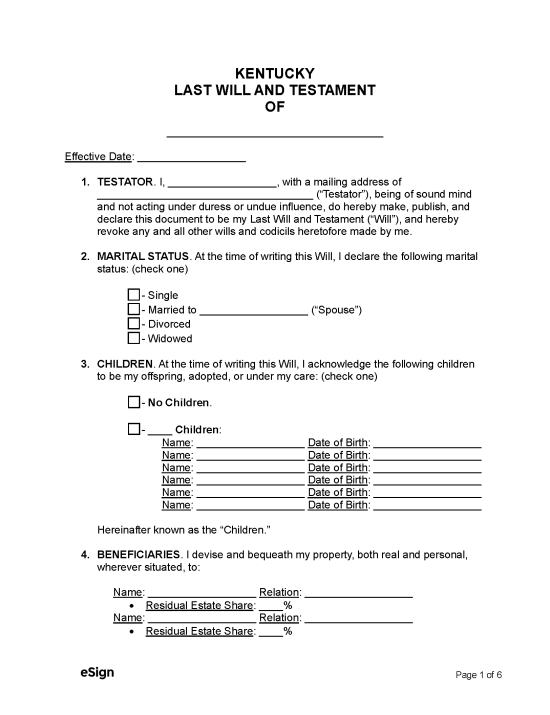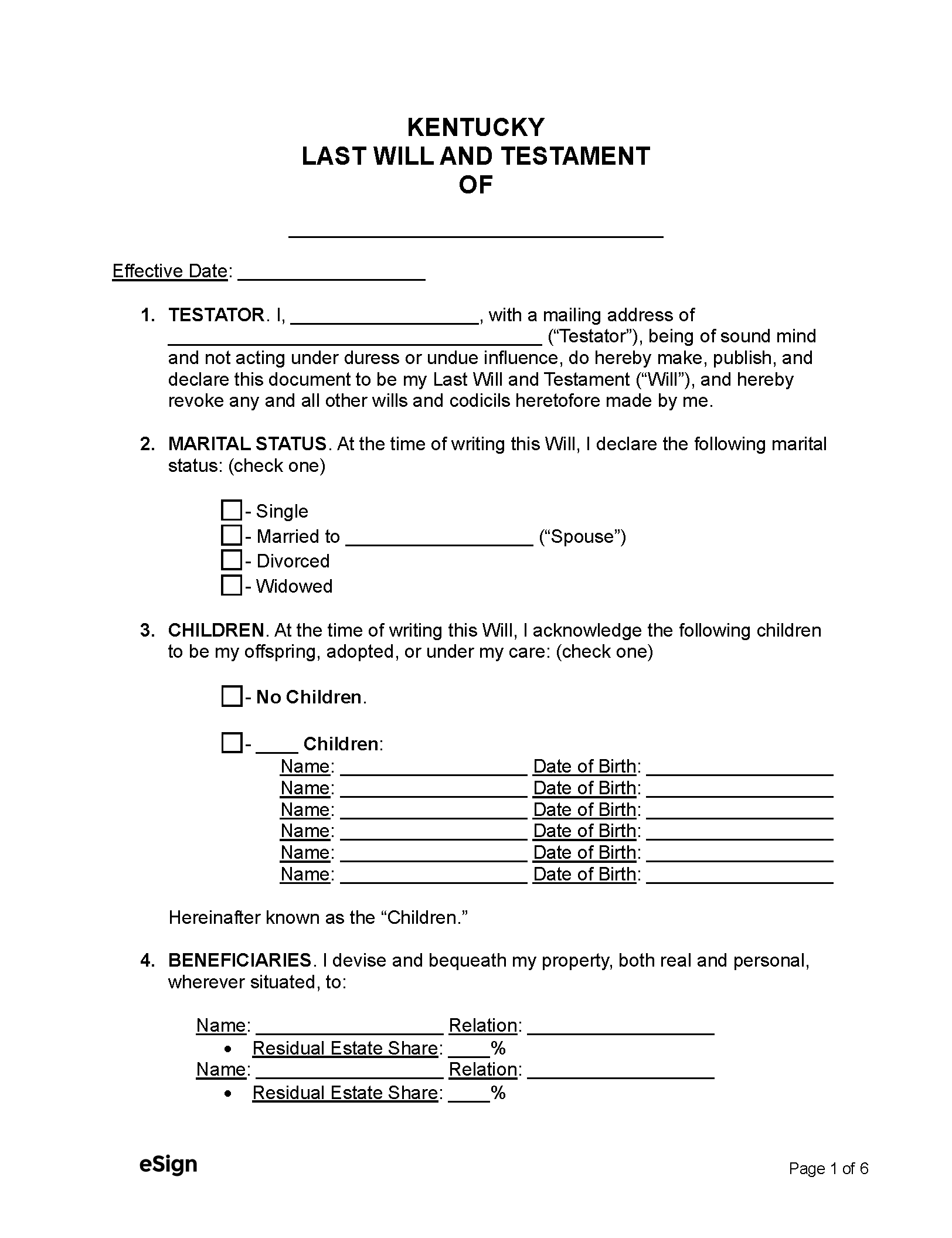State Laws
The estate of a person who dies without a will (intestate) will be distributed according to Kentucky’s inheritance laws instead of the testator’s wishes.[1]
A will can be made by anyone 18 years or older and of sound mind.[2]
Holographic Wills – While holographic wills (handwritten by the testator) are more likely to be contested in probate court, they are legally valid in the state of Kentucky.[3]
Revocation – A will can be revoked (i.e., canceled) using one of the following methods:
- Creating a new will
- Creating a written declaration of the testator’s intent to revoke the will
- Destroying the will purposefully with the intent to revoke it[4]
Signing Requirements – When not handwritten, a will must be signed by the testator in front of two witnesses, who must also sign. The will can also be made self-proved by acknowledgments from the testator and witnesses in the presence of a notarial officer.[5]
Probate Process in Kentucky (8 steps)
Probate of a will must be done within ten years of the decedent’s death.[6] The process will take at least six months, but can sometimes be longer depending on the size of the estate.
- Probate the Will
- Notice of Hearing
- Probate Hearing
- Surety Bond
- Creditors’ Claims
- Inventory
- Debts and Taxes
- Closing Probate
1. Probate the Will
When an estate is worth $30,000 or less and does not include real estate, the will does not have to go through probate. The estate can be distributed without court supervision by filing a Petition to Dispense with Administration.[7][8]
An executor is typically named in the will by the testator, but they cannot act on behalf of the estate until their appointment is accepted by the court except to manage the burial and funeral expenses and preserve the estate.[9] They can, however, start the probate proceedings by filing the original will with the district court where the decedent resided.[10]
In addition to the will, a Petition for Probate of Will and Appointment of Executor (Form AOC-805) must be completed and filed.[11] The court will set a hearing date to determine the validity of the will and the eligibility of the executor as the estate’s personal representative.
2. Notice of Hearing
The person filing the petition may ask the court clerk to request an officer to summon all interested parties to the hearing. This involves the clerk directing the officer to notify beneficiaries, family members, creditors, or any other individuals interested in the will that it has been submitted to probate.[12]
The court might demand that all interested parties appear at the hearing.[13] However, the court may decide to admit the will to probate and commence proceedings without any notification to the parties.[14]
3. Probate Hearing
In most probate hearings, the judge will accept the will to probate and authorize the executor named in the will to handle the administration of the estate. An Order Probating Will and Appointing Executor (Form AOC-806) will be completed by the judge.
4. Surety Bond
The court may require a bond to be provided by the executor to protect the beneficiaries of the estate in case the executor does not perform their administration duties properly.[15] This is usually only required if the will does not waive the bond. The amount of the bond will be set by the judge and entered into the Order (Form AOC-806).
In many probate proceedings, the judge will instruct that the bond be backed by an insurance company (i.e., a surety bond). In this case, a Fiduciary Bond form must be completed and filed with the court.
5. Creditors’ Claims
Once the executor has been appointed, the court clerk will publish notice of their appointment in a newspaper of regular circulation within the district. The notice must include the name of the decedent, the name and address of the fiduciary, the date of their appointment, and the date by which all claims must be made by creditors.[16]
Creditors have six months from the date the executor was appointed to demand a claim from the estate, after which, the executor will be able to distribute and close the estate.[17]
6. Inventory
An inventory of the estate must be completed by the executor and entered into the Inventory and Appraisement of Estate (Form AOC-841). This document must be filed with the court clerk within two months of the executor qualifying for their appointment.[18]
7. Debts and Taxes
Before an estate can be distributed to the beneficiaries, the executor must handle the decedent’s taxes and debt obligations. The following items may need to be settled before estate distribution:
- Debts – If any claims are made within six months after the executor was appointed, they must make the appropriate payments.
- Individual Income Taxes – If the decedent received income between the date their last return was filed and the date of their death, the executor may need to file an Individual Tax Return on their behalf.
- Estate Income Taxes – Although this usually only applies to large estates, the executor may need to file an Estate Income Tax Return if income was generated since the last tax return was filed.
- Federal Estate Taxes – Federal estate tax is generally reserved for very large estates, but if the estate does qualify, the executor must file a Federal Estate Tax Return.[19]
- Inheritance Taxes – Inheritance tax may be owed if assets are transferred to beneficiaries who are individuals not closely related to the decedent. If the estate has an inheritance tax obligation, the executor should receive a notice from the Department of Revenue. The taxes must be paid, and the notice filed with the probate court clerk. If no inheritance tax is required, the executor should file an Affidavit of Exemption with the court.
8. Closing Probate
After all debts and taxes have been settled, the remaining assets are to be distributed by the executor to the beneficiaries named in the will, as long as six months have passed since the executor’s appointment. To close probate, the executor can use one of the following methods:
1. Informal Final Settlement
The quickest and simplest method of closing probate is called an informal final settlement, which means the court won’t have to review the details of the estate’s administration and no hearing will be required.
To attain an informal settlement, the executor must have all beneficiaries sign an Affidavit of Waiver of Formal Settlement (Form AOC-851). The executor will file all these affidavits along with an Informal Final Settlement (Form AOC-850) with the court. If approved, the judge will sign the bottom of the document and the executor will be relieved of his appointment.
2. Formal Final Settlement
If any of the beneficiaries do not sign an affidavit, it means the executor will have to generate a complete accounting of the estate’s administration, including expenses, costs and debts settled, taxes paid, and how the remaining assets were distributed. They will then file the Final Settlement (Form AOC-846) and send a copy to all interested parties.
If any parties object to the Final Settlement, the court will hold a hearing to review and settle these objections. After all matters are resolved, the executor will administer the remainder of the estate according to the court’s order, and their authorization as representative of the estate will terminate.

